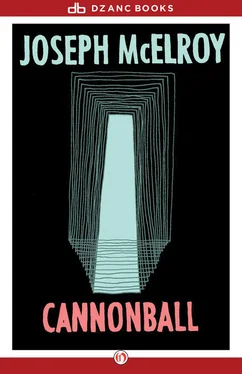Joseph McElroy - Cannonball
Здесь есть возможность читать онлайн «Joseph McElroy - Cannonball» весь текст электронной книги совершенно бесплатно (целиком полную версию без сокращений). В некоторых случаях можно слушать аудио, скачать через торрент в формате fb2 и присутствует краткое содержание. Год выпуска: 2013, Издательство: Dzanc Books, Жанр: Современная проза, на английском языке. Описание произведения, (предисловие) а так же отзывы посетителей доступны на портале библиотеки ЛибКат.
- Название:Cannonball
- Автор:
- Издательство:Dzanc Books
- Жанр:
- Год:2013
- ISBN:нет данных
- Рейтинг книги:5 / 5. Голосов: 1
-
Избранное:Добавить в избранное
- Отзывы:
-
Ваша оценка:
- 100
- 1
- 2
- 3
- 4
- 5
Cannonball: краткое содержание, описание и аннотация
Предлагаем к чтению аннотацию, описание, краткое содержание или предисловие (зависит от того, что написал сам автор книги «Cannonball»). Если вы не нашли необходимую информацию о книге — напишите в комментариях, мы постараемся отыскать её.
continues in McElroy's tradition of intricately woven story lines and extreme care regarding the placement of each and every word. A novel where the sentences matter as much as the overall story.
Cannonball — читать онлайн бесплатно полную книгу (весь текст) целиком
Ниже представлен текст книги, разбитый по страницам. Система сохранения места последней прочитанной страницы, позволяет с удобством читать онлайн бесплатно книгу «Cannonball», без необходимости каждый раз заново искать на чём Вы остановились. Поставьте закладку, и сможете в любой момент перейти на страницу, на которой закончили чтение.
Интервал:
Закладка:
“Zach would hear about it,” my sister called from the other room. “The way I do,” she added. “You!” said our mother. “S’what I do for a livin’,” said my sister.
There was an interesting homelessness in Umo’s occupational movements that held you and disturbed you. With a chance for you to achieve. What? It was not anything illegal that kept Umo in reserve for my father, my mother retailing to him what I told her of being stopped by his friend Zoose, the state cop; Zoose’s new brother-in-law the Hispanic rhythm guitarist, a recent citizen; a recording studio guy in Chula Vista: my father had Umo in his sights and in those of others, his contacts, I know, and should have guessed then. For me, though, it was something I had achieved, this resolve in my father to deal with Umo. Not ask him to compete in time trials. While seeing him some evenings occupy the swimming pool and the smaller adjoining and deeper diving pool, my father saw him also as a traveler among several homes, an alien commuter to be reckoned with, a powerful “body business” to be included without any singling out in talks to the team at pool side, and (once I remember) “of use to us” I was told, but “keep it under your hat.” My helmet, one day.
Like his size (“Have a little humility,” said my mother) — he should be smaller? — the mass, the sweat of his well-fed ribs and back meat, Umo’s truck trips were thought “dirty” by my brother. A phenomenon (and associated with me, my future, not anyone else’s, not even Umo’s). From my mother, contempt for being orphaned and nothing “done about it.” She meant, I believe, infected (sort of) by his parents’ absence. And a Mongol -Manchurian, it had been learned, Mongolian stuck in her mouth — not even quite Chinese, my mother said, who called the police on Umo when Corona phoned from the motel that the white truck with the Baja plates was parked outside, though my father when he got home said he would take care of it: but why? Only because Umo would be useful one day.
Poor boy, with no papers, no family, no good reason to be here floating around, my mother observed, “grandfather a Muslim, they say”; (“His grandfather’s dead, Mom”) and he gives to beggars when Liz said it’s encouraging laziness (“Liz said that to you?” I said.): description shaping rumor and presently from my uncle — was it Fall 2001?—an interest in “identity papers for all citizens,” putting us on a wartime footing like Europe in the movies. Reading the paper at the breakfast table, “We’re running a check on him,” my father said to my mother, meaning Umo. A way to let me know — but what? — though I heard her tell him my view on begging as if it was mine and not the minister’s. My brother was leaving the room — because I had entered it, I often thought — but paused at the threshold hearing me making a statement he instinctively knew was pointed toward a concept he could get behind: In class once Milt had said that the old Lutherans objected to the monk’s oath of poverty because if you vow to remain poor you refuse the chance of a future job, gainful employment, and, key to it all as you find in the parables, profit. “The Lutherans don’t put up with any nonsense,” said my brother, gone into the hall. Umo kept much information, if not his thoughts, to himself. He couldn’t speak sometimes.
Everyone comes to our city sooner or later, my uncle said; they hear about it, it’s nice here. A child wrestler he’d heard Umo had been where he came from near the Mongolian border, some city it slipped his mind. Like Sumo in the balancing, the need to keep on your feet, but “nothing like Sumo if you know what I mean.”
The truck was in your mind speeding along the I-8 one night, seen one day in City Heights. Umo a big lug who knew exactly, I thought, what he was doing, cheerful, routinely resigned after thirty years in the same job — this fourteengoing-on-fifteen-year-old alien driving a truck. Milt said he’d damn well get a look inside. There was too much talk about Umo, he thought. This proved to be a time when Umo would be gone for days. I imagined him in Mexico sponging (which was true) illegible graffiti off his white truck — those beautiful Baja plates encrusted with seaweed, mud, silvery waste. Where would Umo contribute? An unbelievable swimmer, yet my father hadn’t said the word.
He was an underestimated coach, called on to step in and help potential Olympic backstrokers in early Zone meets in 2001 (to my surprise) and 2002. By then, something else was afoot. His love of country well known, I like a foreigner once had asked him what exactly the country was and where would I go to see it? He lowered his eyelids — like, Did I hate him? Only that I had known it would drive him nuts and he would not show it (though would), and because I had thoughts about it myself and ran them by my sister, which touched her strangely.
“If you have to ask, I can’t tell you,” he said.
And on the fishing trip when I was ten, I had taken some lame (I guess) pictures of just the roadside at Tortugas Bay and a rusty panel of scrap-iron fence not even the cactuses inside the fence and wished I’d had the buzzing sounds to go with it and had a fleeting thought about a real real close-up so you couldn’t tell what it was — this at ten, probably worth encouraging — and the boring foothills by a village named El Arco, some other shots — and my father took the camera away for two days because I was wasting film, but I recall he regarded Baja Mexico as part of the United States and almost was friends with me again when I remembered the fishmonger my mother visited and what he had told her about color-added salmon and hatchery-bred trout which seemed reasonably sad though when I said they could use some fish hatcheries down here in Baja to feed the people but what was the matter, they’d had fish hatcheries in ancient times (I thought), he laughed for once. Took the camera away another day reading my mind about men and women walking the highway — thinking (for myself) who were these people, Americans?
And when we got home I didn’t have the camera to show my sister and I thought she was making fun of me when she wasn’t and I got her down on the dining room floor and split her wrist rubbing it on the rug and not a whimper out of her, though hysterical giggling, a strong person, my baby sister, and I told her about fish hatcheries in ancient times and then thought of loaves, while I held her down and she waited, and I never took the individual snapshot very seriously after that but the roll turned up partly developed and I remembered I’d meant to give the real real close-up to my teacher Mrs. Stame who was thin as a stem and had given us a poem about a train to read which was hard until you got it and I had thought it was about a shadow but I was wrong.
After practice at East Hill one night (the phone from the Principal’s office at my former high school ringing off the hook because my father coached the team there too, supposedly, and blew them off now and then), after optional weigh-in on the old physician’s scales with the height rod he had sat us all down on the hard tiles to talk hygiene, diet, bananas and fluids sustaining the electrolytes in the system and preventing cramp; sex as primarily only a matter of releasing tension; and the coming war he spoke about also (standing). Sometimes a nation feels its mission greater than other daily struggles like beating your time for the two hundred, and to submit to that fate now could sharpen the competitive edge for these lesser struggles — let’s take inventory and just tend to business, he said. World Series of swimming was an idea of his. The Olympics but more than nations. Silence and some inner, partnering echo of tiles and water stilled the settling echoes of his voice. A war? I thought. A war to end weapons, he had said. Well, we could do that.
Читать дальшеИнтервал:
Закладка:
Похожие книги на «Cannonball»
Представляем Вашему вниманию похожие книги на «Cannonball» списком для выбора. Мы отобрали схожую по названию и смыслу литературу в надежде предоставить читателям больше вариантов отыскать новые, интересные, ещё непрочитанные произведения.
Обсуждение, отзывы о книге «Cannonball» и просто собственные мнения читателей. Оставьте ваши комментарии, напишите, что Вы думаете о произведении, его смысле или главных героях. Укажите что конкретно понравилось, а что нет, и почему Вы так считаете.












